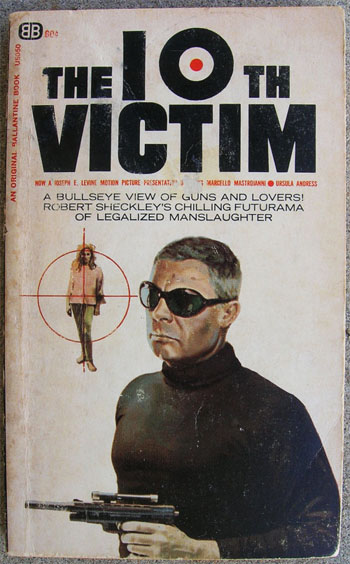
Introducing the new issue of Film Quarterly, editor B. Ruby Rich argues that “the question of what is shown in films and what is not seems more important than ever. Cinema itself is in a state of immense transition, yet it’s hard not to notice that attention is lavished disproportionately on technology and auteurist style, with the question of theme, focus, and subject matter repeatedly sidelined.” But “the horrors of the age demand expression in what I still believe to be its foremost medium.”
Also in FQ, Regina Longo interviews Kristen Whissel, whose “latest book, Spectacular Digital Effects: CGI and Contemporary Cinema, examines the relationship between narrative and spectacle in contemporary blockbuster cinema.” FQ‘s got an excerpt, too.
MORE READING
Brad Stevens, who has a new novel out, The Hunt, argues in Sight & Sound that novelizations per se are not to be dismissed out of hand. Behind more than a few of them, there’s a pretty good story.
Jonathan Rosenbaum in 1993: “Whatever one thinks of Fellini, it seems to me inarguable that Antonioni is far and away the greatest living Italian filmmaker; indeed, with the exception of Roberto Rossellini, he is probably the greatest of all Italian filmmakers.” The piece then tracks the ups and downs of critical reception of Antonioni’s work, primarily in the States, up through the early 90s.
“Martin Scorsese had a terrific time during the production of the documentary Public Speaking, his portrait of writer and New York mainstay Fran Lebowitz,” writes Reverse Shot‘s Jeff Reichert. “I know this not from anecdotal evidence or first-hand experience of the shoot, but from what’s on display in the film itself.”
RogerEbert.com‘s posted an excerpt from Michael Koresky‘s new book, Terence Davies.
Writing for Artforum, Nick Pinkerton notes that “the influence of the [Pee-wee’s Playhouse] on impressionable minds has in subsequent years proved to be inestimable.”
IN OTHER NEWS
At Thompson on Hollywood, Ryan Lattanzio has the lineup for this year’s AFI Fest, running from November 6 through 13 in Los Angeles.
Terrence Malick: The Art of Voiceover by Scott Tobias
The BFI‘s discovered two episodes of At Last the 1948 Show (1967), a British television comedy series featuring John Cleese and Graham Chapman (as well as Tim Brooke-Taylor, Marty Feldman and Aimi Macdonald) that predates Monty Python’s Flying Circus by two years.
The 2014 Stranger Genius Award in Film goes to animator Drew Christie. David Schmader: “When Christie was first nominated for this award back in 2012, my colleague Charles Mudede wrote that his work ‘is always strange and surreal in a very smart and compelling way’ and that it has ‘three basic components: visual art, cinema, and historical research. The visual art is the surface of his work, the cinema is what animates the surface, and the historical research is what gives the animated surface its depth.’ Two years later, I cannot improve on this summation. Except to add that humor is usually an element, too.”
Matt Singer, who’s been the news editor at the Dissolve since the site’s launch just over a year ago, has announced that he’ll be moving on.
Farran Nehme‘s posted an update on goings on around her place. Her first novel, Missing Reels, will be out shortly, she’ll soon be introducing a screening of Leo McCarey’s The Awful Truth (1937), she’s discussed Henri-Georges Clouzot’s The Murderer Lives at Number 21 (1942) on the Masters of Cinema Cast and she’s got good news regarding the overdue restoration of Henry Hathaway’s To the Last Man (1933).
GOINGS ON
Austin. “Eight days of films, four days of panels.” The Chronicle‘s Marjorie Baumgarten writes up the highlights of this year’s Austin Film Festival, opening today, while Kimberley Jones focuses on the screenwriting conference.
IN THE WORKS
Follow the progress of Philippe Grandrieux’s Malgré la nuit on Facebook.
Deadline‘s Mike Fleming Jr. reports that Charlie Kaufman will be adapting Arthur Herzog’s “classic 1978 science fiction novel” I.Q. 83. Steve Carell will play a scientist battling a virus his team has accidentally unleashed which “progressively lowers the IQ of the afflicted… It becomes a race against time as the scientist struggles for a cure, even as he feels himself growing dumber…. Herzog wrote it as serious science fiction, but the aim of this new version is to do a scathing satire, on the order of Doctor Strangelove.”
Ethan Hawke will play Chet Baker in Robert Budreau’s Born to Be Blue. Scott Roxborough has details in the Hollywood Reporter.
Justin Timberlake‘s official site has announced that Jonathan Demme will direct and film the final shows of Timberlake’s 20/20 Experience World Tour on January 1 and 2 in Las Vegas.
A 1966 doc on the making of a film with two years of production to go,
Kubrick‘s 2001: A Space Odyssey
ENDNOTE
Listening (82’23”). On Filmwax Radio, Adam Schartoff talks with Volker Schlöndorff about Diplomacy, with Zachary Wigon and Kate Lyn Sheil about The Heart Machine and with Gregory Kohn about his Kickstarter campaign for Come Down, Molly starring Eléanor Hendricks, Kentucker Audley and Lindsay Burdge.
For news and tips throughout the day every day, follow @KeyframeDaily. Get Keyframe Daily in your inbox by signing in at fandor.com/daily.



